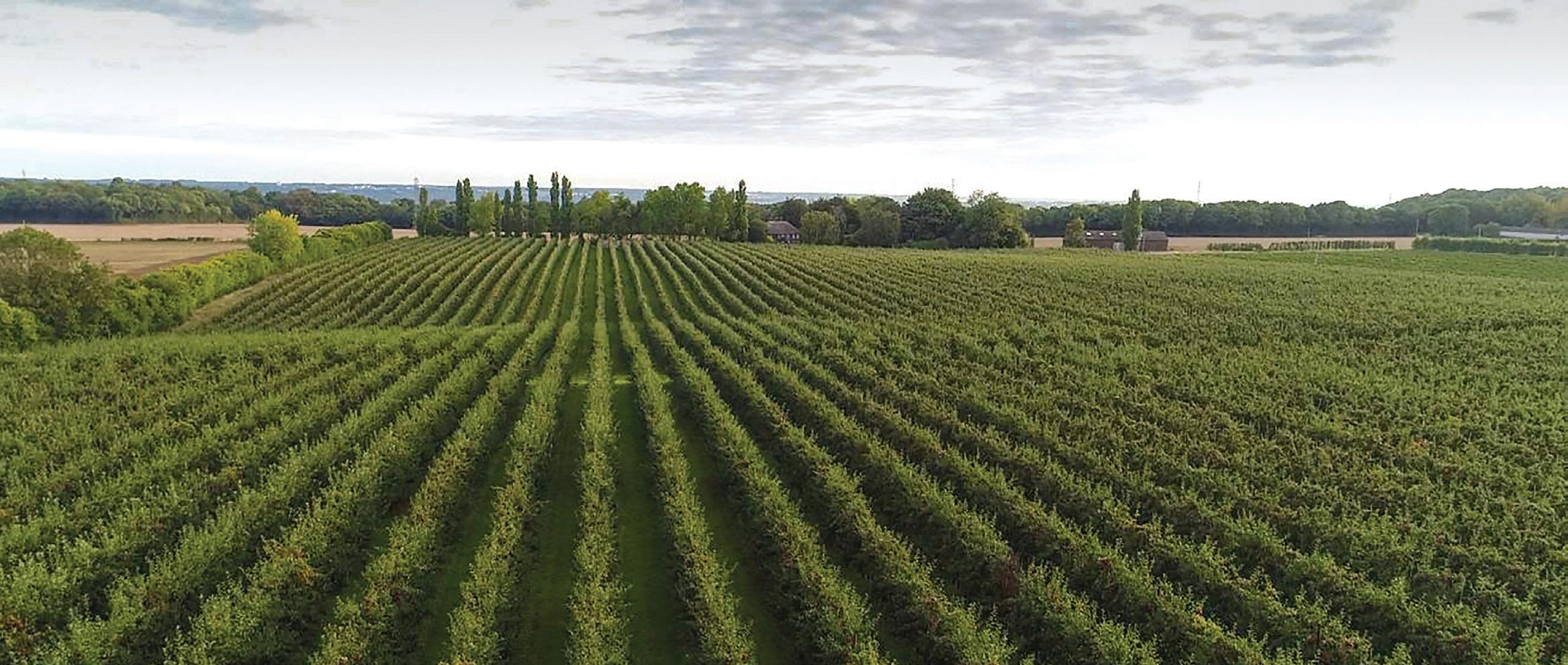
12 minute read
Money
Ups and downs
Despite the constraints of Covid-19, many businesses in the South-East reported increased confi dence during June, according to a national bank’s tracking fi gures. However, the trend is still way down on previous years.
Lloyds’ commercial banking “business barometer” reading taken at the beginning of July showed that overall confi dence for fi rms in the region rose 14 points to -31%, compared with May. More than half (52%) of companies said they expected to be operating at more than 50% of capacity by the end of June.
On the downside, a quarter said they did not expect to see any improvement within three months, 8% said it would take more than a year and 9% said they did not expect to survive the crisis. Regional director for the South East at Lloyds Bank commercial banking, Phil Kirk, said: “While still in the red, confi dence across the South East has improved by some way since last month. It’s also encouraging to see that the majority of the region’s fi rms are operating at above half of capacity. Despite many sectors opening back up, there’s still a long road ahead to recovery. We’ll be by the side of South East fi rms as they plan for the future.” Cheers for the help
A business that relies on the hard-hit hospitality sector has been given a loan from a national bank to help it through the crisis.
Pulborough-based Hepworth Brewery received an overdraft extension and a £500,000 Coronavirus Business Interruption Loan Scheme loan from HSBC UK. The funding will enable the company to protect 30 local jobs and adapt its business model to deliver its beer directly to customers.
Hepworth Brewery was established more than 20 years ago and creates award-winning craft beer, supplying national retailers like M&S and Co-op. In late March, the company lost 75% of its business operations overnight due to the Covid-19 pandemic, as suppliers and the hospitality sector was shut down by the government.
The six-fi gure loan will help the brewery to cover business costs and lost income streams. It will also support the business’s move to sell beer online to local customers in the West Sussex area – a vital income stream allowing the brewery to continue generating orders. › Andy Hepworth



MD and head brewer Andy Hepworth said: “With the hospitality sector having largely been at a standstill, a lot of our regular clients are no longer trading, which has had a huge impact on our earnings and growth.” He said the loan would support the brewery for the next six months and had given him confi dence that the business would recover.
Area director for Sussex and Surrey at HSBC UK, Andrew Steer, said: “We were pleased to be able to support the business, despite these unprecedented times, and look forward to seeing the business not only recover from this diffi cult period, but continue to grow.”
A fruit-filled deal
A fi fth generation farming business in the Garden of England is preparing for the next chapter in its long history, after buying out a competitor.
Bardsley England, based at Boughton Monchelsea in Kent, has been going for 128 years and has built a reputation as one of the UK’s leading fruit farmers, producing about 10,000 tonnes of fruit. Its acquisition of Newmafruit increases this volume to 23,000 tonnes.
MD Ben Bardsley said: “Newmafruit is an excellent addition to the Bardsley England group and this is a great opportunity for the business. It will enable us to increase our off ering of top and stone fruit to the UK market and therefore


enhance the strategic partnerships and alliances we have already forged.”
Bardsley’s were able to acquire the competitor company using a funding package arranged by Shawbrook Bank, whose director Steven Munt said: “Due to the current circumstances caused by the emergence and spread of coronavirus, this was a challenging transaction, with several moving parts involving asset transfers, lease assignments and freehold property to be valued and charged. However, these types of projects are exactly what we thrive on.”
The introduction of Shawbrook to Bardsley’s was instigated by Castle Corporate Finance.
International trade A post Covid-19 perspective
At the end of 2019, Kreston Reeves surveyed 1,109 business leaders of small and medium enterprises (SMEs) across the UK to explore the views of businesses towards international trade as the country looked to exit the EU. The research was to be published in March this year just before the UK and the rest of the world went into lockdown following the outbreak of Covid-19.
In late May 2020, we conducted a follow-up survey of 514 UK business leaders to explore how Covid-19 might change their plans for international trade.
The views of business have never been more important as we begin to emerge from what has been the biggest shock to the global economy and as we approach December’s deadline to secure a trade deal with the EU. Understanding the drivers and barriers to international trade can help businesses plan and take the advice they need to successfully grow overseas.
Our research told us that 71% of UK businesses had some degree of international trade prior to the outbreak of Covid-19 and that 55% of those businesses have, unsurprisingly, seen that trade fall away.
It is encouraging that over half (51%) of the business leaders surveyed say their view on the importance of exporting has increased in a post Covid-19 world. 45% also expect international trade to return within the next 12 months. Equally encouraging is that of the 29% of businesses with no international trade before the outbreak of Covid-19, 34% of them now say they are likely to look to overseas markets to aid their recovery.
Both our December 2019 and May 2020 surveys suggest UK businesses are outward looking and have a strong international focus. But international trade is, at the best of times, not without its challenges.
Our survey showed that the biggest single concern is tax, VAT and duties (23%), followed by currency fl uctuations (20%), and tariff s and trade barriers (19%). Red tape (18%), the cost of international trade (18%), logistics (17%), and getting paid (14%) are all very real barriers to international growth.
These challenges cannot be addressed in one simple measure. Business leaders told us that a mix of measures are needed to make international trade easier.
Top of that list is, for 32% of business leaders, a free trade deal with our








European partners. Yet at the time of writing that is looking ever less likely.
As the UK looks to reposition itself on the global stage, Kreston Reeves asked business leaders where their focus is likely to be over the next fi ve years? It will be of no surprise that European markets will dominate – 58% of businesses told us that is where they see international growth, compared to just 36% for North America.
The need for a comprehensive trade deal with the EU is paramount, as will be separate trade deals around the world. There has to be a concern as to whether these deals can be delivered in the now very tight timeframe remaining as governments around the world manage the aftermath of Covid-19. A full copy of the Kreston Reeves research published in a report Trading internationally 2020 – A post Covid-19 perspective, can be found at www.krestonreeves.com/publications. We will also be publishing a series of articles that looks in more detail at the challenges facing businesses.
Andrew Wallis
Corporate and International Tax Partner at Kreston Reeves
T: 0330 124 1399 E: andrew.wallis@krestonreeves.com
www.krestonreeves.com
Join our Looking ahead webinars
Our webinars aim to help your business achieve a brighter future covering topics including rebuilding your finances, funding, scenario planning, growth and purpose.
Looking ahead... to the next 3-5 years Looking ahead... retaining agility 26 August 2020 | 12:00pm - 1:00pm 28 October 2020 | 10:00am - 11:00am Looking ahead... to the future with purpose 23 September 2020 | 9:00am - 10:00am

Previous recordings of the webinars from our Looking ahead series are now also available to view on demand at www.krestonreeves.com/on-demand.
For further information or to register to join our Looking ahead webinars: Email: events@krestonreeves.com Visit: www.krestonreeves.com/webinars



Safety surfaces
Decontamination measures have been devised to ensure work can continue safely on construction sites across the South East.
Specialists SafeGroup have been busy carrying out disinfection of plant and machinery, including huge diggers and earth-movers. Staff wearing full body suits administer broad-spectrum electrostatic disinfectant sprays capable of killing the Covid-19 pathogen. It bonds closely to surfaces and can provide protection for users against the virus for up to 30 days.
SafeGroup is the fi rst emergency cleaning specialist company in the UK to provide virus protection and its CEO Steve Broughton is proud of its achievement.
He said: “Data from the Offi ce for National Statistics shows male construction workers have among the highest death rates from Covid-19 in the UK, with 25.9 deaths per 100,000 males. Construction contractors and plant operators need to remain vigilant to protect their teams.
“Covid-19 is a game-changer, in terms of workplace hygiene. The expectations of employees and customers on personal safety aren’t being heightened, they’re being rocketed through the roof, which is why we’re off ering testing to prove workplaces are free of Covid-19.” Reasons to be cheerful
A study of more than 1,000 SMEs in the South East has revealed signs of optimism in the construction sector, as the industry emerges from lockdown.
Data from Powered Now, off ering back offi ce solutions for small trade businesses, questioned 179 companies in the building and construction sector and discovered that sales fi gures for the fi rst half of 2019 and 2020 compared favourably, despite the impact of Covid-19 on April and May.
CEO of Powered Now, Benjamin Dyer, said the fi gures showed that, despite the threat of the pandemic, the building sector had not gone into decline.
He added: “This data gives us reason to be optimistic. Many companies quickly adapted to the shutdown, fi nding ways to operate and prosper, whereas others took full advantage of the government’s economic care package. Either way, the consistent growth since the initial downturn at the start of lockdown shows the resilience of many innovative SMEs.
“The government’s economic response helped buoy SMEs during the economic downturn, which can now begin trading again as lockdown regulations ease. This bodes well for the future, showing that Britain’s entrepreneurial spirit is still very much alive in the wake of the pandemic.”
Country moves
Activity in the country homes market has surged, since the relaxation of lockdown measures.
Estate agent Roger Coupe reports an increase in “serious buyers, in a position to move quickly” and many have shown an interest in viewing Millwood Homes’ properties in the village of Ewhurst, Surrey.
Roger said: “People may have been sitting at home during lockdown with time to research what they want – for example, many people seem more knowledgeable about Help to Buy and the boost it can off er buyers. While there are other new homes developments in the Cranleigh area, Cherry Tree Lane stands out in terms of its attractive traditional village style and boutique feel.”
Sales and marketing director at Millwood Designer Homes, Philip Brown, added: “Many of our current buyers are moving from the London suburbs, or from inside the M25, and want more of a countryside feel.”


MODERN AND AFFORDABLE
Morgan Sindall Construction has delivered 12 brand new homes in Hangleton ahead of schedule, as part of Brighton & Hove City Council’s New Homes for Neighbourhood programme.
The development in Buckley Close provides much-needed aff ordable council housing in the area, while also giving residents high-quality homes with modern living space. Consisting of three, two-storey blocks, the new homes will be among the fi rst tranche of properties advertised under Brighton & Hove City Council’s lettings scheme since the start of the Covid-19 lockdown.
Councillor Gill Williams, Brighton & Hove City Council’s chair of housing, said: “We’re making good use of council-owned sites, like these, to build extra homes wherever we can.”


PLANNING SECURED A joint venture (JV) between Chancerygate and industrial scheme for over 20 years. Pre-sale and Hines has been granted planning permission to pre-let discussions with prospective occupiers are speculatively develop a new 100,000 sq ft trade currently ongoing. park on Vale Road in Tonbridge. Chancerygate development manager, Tom
Called Tonbridge Trade Park, the industrial and Faulkner, said: “We are very pleased to be granted trade counter scheme will comprise 15 high-quality the opportunity to rejuvenate a prominent site units ranging from 4,000 sq ft to 15,000 sq ft and which has lain dormant for a number of years. has a gross development value of around £20m. “Tonbridge Trade Park will see us provide the
Located just one mile from Tonbridge town region with much-needed, modern industrial and centre, the development will provide a variety of warehousing accommodation with the potential to trade, warehouse, industrial and other roadside create new jobs in rapidly growing sectors of the opportunities, as well as off ering easy access to the economy.” M25. Joint agents on the scheme are Bracketts and The 4.11-acre site will be Tonbridge’s fi rst new DTRE.
Commuter hotspot
Work is due to start on a development of 600 homes set in a country park near Lancing, Sussex.
The CALA Homes development off Hayley Road, pictured, will include the 28-hectare park, an Ikea store and a primary school. 30%of the properties will be designated as aff ordable housing, in a mix of rented and shared equity homes.
With Lancing station just a mile away, the development is likely to attract commuters as well as families seeking an out of town setting.






Supporting your business recovery










